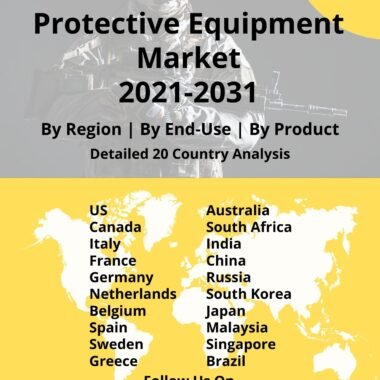Description
Bullet Proof Vests Market
To defend against incoming projectiles like gunshots and shrapnel, use body armor. The military is using these body vests more frequently. However, due to the rising need for safety, the market penetration of bulletproof body vests has been expanding in the civilian market. The sale of civilian bulletproof vests is legal on all international markets.
Presently the market for body armor is noted to have expanded beyond its application within the military domain. It is now used across various commercial segments and police forces to provide added protection to both the law and order as well as regular civilians. According to bullet proof vests market analysis, it is noted that there are two primary forms of body armor available today: standard non-plated body armor, which offers moderate to significant protection, and hard-plate reinforced body armor, which offers maximum protection and is typically worn by combatants.
Major factors driving bullet proof vests market Growth
According to the regional competitive mapping for the market for bullet proof vests market growth, North America has the greatest consumer base in this industry. This is primarily because of the laws and regulations that are implemented in this country. Due to the rising crime rate and border tensions in this region, APAC is predicted to increase at the quickest rate. The demand for civilian bullet proof vests market report in this region is expected to increase due to the need for civilian safety. The laws governing the ownership of bullet proof vests market trends are less strict in developing nations. As a result, in these market places, the acquisition and use of the same are simpler.
Trends influencing the bullet proof vests market Size
Within the EU, military-grade body armor cannot be imported or exported. Within the European market for commercial bullet proof vests market size, protection levels over NIJ 4 are categorized as armament material. According to surveys, B2C channels like shops are selling bullet proof vests market forecast all around the EU.
However, there are several standards and laws in place all across the world that limit the possession of bullet proof vests. For instance, regulations protect the ownership of ballistic vests in Australia and Argentina. As a result, in the aforementioned markets, only licensed individuals are permitted to own ballistic vests. Another market that prohibits civilians from owning bulletproof vests is Thailand. The punishment for having body armor without a permit is roughly five years in prison. In contrast, only those who have been convicted of a crime are allowed to own body armor in the United States. Alternatively, there are no restrictions on the use or ownership of body armor and ballistic vests in Italy. Additionally, the market for ballistic vests has been altered and rehearsed in the past by many legislation and judicial decisions. The Italian government has made it mandatory for civilians working in the private security industry to wear ballistic vests.
Bullet proof Vests Market Forecast & Dynamics
The proper ownership of bulletproof vests is protected by criminal sanctions. Varying regulations govern the ownership of bulletproof vests in Canada. Some of the states that prohibit the illegal possession of bulletproof vests include Alberta, British Columbia, and Manitoba. In the aforementioned states, the certification of individuals with a license to possess ballistic vests is the responsibility of the provincial government. These standards’ implementation limits the entire market addressable for civilian bulletproof vests. The laws are in place primarily as a result of an increase in crime across all international markets. A rise in mugging, terrorism and other anti-band acts is thought to be one of the main drivers behind the imposition of the aforementioned regulations.
Bullet proof Vests Market Analysis for Recent Developments
When examining the market’s supply side, it becomes clear that sophisticated materials, material science engineering, and engineering play a crucial part in producing bulletproof vests. Nylon, Kevlar, Twaron, Spectra, and Polyethene Fiber are a few of the materials frequently utilized to make bulletproof vests. When it comes to the building materials utilized to make body armor, Kevlar is said to hold the biggest market share. In the market for body armor, newer materials that improve performance and sustainability are being launched. The business EnGrade, for instance, has been working to lessen the carbon footprint created by the production of weapons materials.
When compared to aramid vests, one such material, Dyneema, reduces carbon footprint by about 30%. It is still up for debate how these products will be used and how far they will penetrate the civilian sector. However, theories contend that growing public concern over environmental degradation would encourage the use of sustainable alternatives like bulletproof vests produced from plant-based materials in civilian settings.
GE Aerospace reported a strong third-quarter performance, with significant increases in orders and revenue growth. In both orders and revenue, the company experienced organic growth of more than 20%. Commercial Services and Equipment revenue increased by about 30% organically, while Military revenue increased by about 20% organically. Internal shop visits increased by about 25%, according to the January financial announcement. The nearly 50% increase in LEAP unit orders is indicative of a strong performance in the equipment sector. This revolutionary initiative has been in the works for 15 years. Professor Naresh Bhatnagar of IIT Delhi’s Centre of Excellence on Personal Body Armour recalled a watershed moment in 2008. After being hit by enemy fire while on duty, an Army Major stressed the critical need for a lighter bulletproof jacket. He underlined that the jackets of the time, which were mostly iron-based and weighed between 22 and 25 kg, were difficult for soldiers to wear in combat. With global interest focused on their creation, the IIT-Delhi team is prepared to present it at a NATO meeting in Germany. The researchers are optimistic that their cutting-edge protective gear will soon be protecting Indian soldiers on the frontlines.







